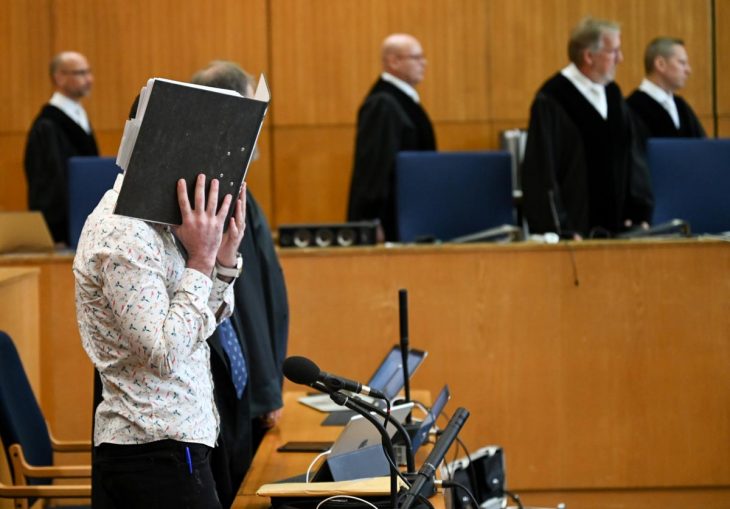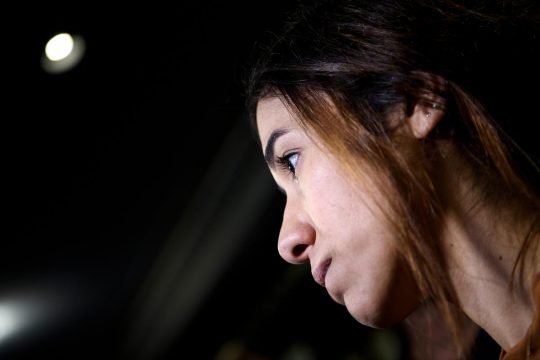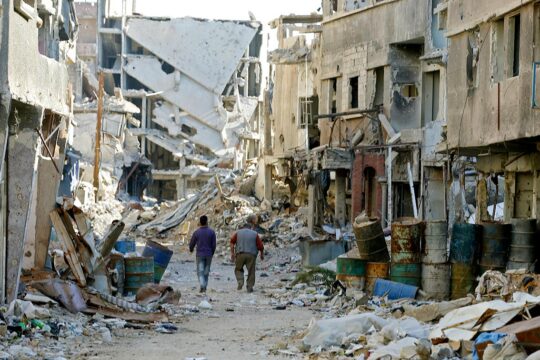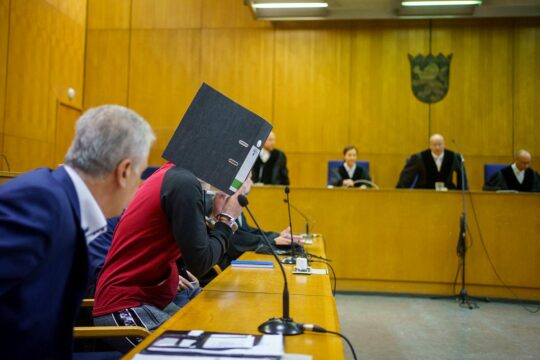A 5-year-old girl tied to a window in the scorching midday heat of an Iraqi summer, calling for her mother before eventually falling silent, allegedly dead. The crime itself sounds horrible enough, and yet there is more to it than a cruel punishment causing a child’s death. Prosecutors at the Higher Regional Court in Frankfurt, Germany, are trying to prove that the incident was part of a larger mission: the Islamist organization Islamic State of Iraq and the Levant (ISIL or Daesh)’s attempt to extinguish the Yazidi minority in Iraq. The court in Frankfurt could be the first to hold an ISIL-fighter accountable for genocide against the Yazidis.
Six years ago, ISIL invaded Sinjar in Northern Iraq, home to the Yazidi minority, killing and displacing hundreds of thousands of Yazidis. Women and children were captured and sold into slavery, where they were raped and abused. According to the United Nations, the crimes against the Yazidi population qualified as genocide. They received world recognition through the 2018 Nobel Peace prize given to Nadia Murad, a Yazidi young woman who survived the ordeal. Today this crime is finally brought to court in two parallel trials. In Frankfurt, Taha al-J., a 37-year-old Iraqi, is accused of genocide, as well as war crimes, crimes against humanity, human trafficking, membership in a terrorist organisation and murder. The trial started in April. It is based on the principle of universal jurisdiction which allows German authorities to prosecute crimes against international law that have no direct link to Germany. The defendant’s wife Jennifer W., a 29-year-old German convert, is accused of war crimes, murder and ISIL-membership in a separate trial that started in Munich last year.
“The killing of one person can constitute genocide”
According to the indictment, Taha al-J. and his wife had held the Yazidi girl and her mother as slaves in their house in the Iraqi city of Fallujah, where they forced them to convert to Islam. The captives were regularly abused and punished, which allegedly caused the little girl’s death between July and September 2015. Taha al-J. is accused of tying her to a window and exposing her to the midday sun for hours, allegedly leading to her death. According to the girl’s mother, the defendant took her lifeless body to a hospital and returned without it. Now, prosecutors in Frankfurt face two challenges: to prove that the child was killed, and to prove the intent to destroy the religious group she belonged to.
“According to the code of crimes against international law, the killing of one person out of a group can constitute genocide, but the special intent to commit genocide, as defined by the jurisprudence, has to meet a very high threshold and is therefore more difficult to prove,” says Natalie von Wistinghausen, the lawyer of the girl’s mother Nora T., who survived the ordeal and has joined the trial as plaintiff. Nora T.’s accounts of living in the ISIL-household – being forced to convert and to pray, being told that Yazidis are infidels – are important pieces of evidence to expose the defendant’s ideology. Her testimony of how her daughter died is even more crucial: apart from Taha al-J. and Jennifer W., she was the only eyewitness, and both defendants have kept silent about what happened that day.
Seeking justice for the Yazidi community as a whole
It is due to a fortunate coincidence that Nora T. was able to participate in a trial 3000 kilometres away from her home, in a country whose language she does not understand. After leaving the defendant’s household, she, like many other Yazidi survivors, was interviewed by an organisation called Yazda that documents the crimes committed against enslaved Yazidis in Iraq. In 2018, one of the NGO’s employees heard about the indictments in Germany and noticed the parallels to Nora T.’s story. She contacted the German prosecutors and put them in touch with their key witness, who was then brought to Germany and placed in a witness protection programme. “The trial means a lot to her,” says von Wistinghausen who works on the case together with prominent human rights lawyer Amal Clooney. “She wants justice for herself and her child, but she has also made it clear on several occasions that she wants justice for all Yazidis.”
Her case might indeed be a first step towards justice for the Yazidi community as a whole. “If convictions are handed down, these will be the first convictions of genocide in relation to ISIL’s attack on the Yazidi community of northern Iraq”, says Carmen Cheung, executive director of the Center for Justice and Accountability (CJA), a U.S.-based NGO. “It will be the first formal recognition by a judicial body that ISIL committed crimes with the intent to destroy the Yazidis. It will be a historic moment.” For Cheung the prosecution of crimes against the Yazidis has become possible thanks to the Yazidi community’s extraordinary activism. “That these prosecutions are proceeding is a result of the willingness of women and girls, in particular, to share publicly their experiences under ISIL,” she says.
Was the child really dead?
One of them is Nora T., who has since testified in both trials. Over excruciating days she had to describe exactly how her child was tied up and what exactly the body looked like when it was allegedly lifeless. The 48-year-old woman’s testimony was often emotional and sometimes contradictory, her dialect of Kurmanji was hard to understand due to a speech impairment, and she had problems specifying some information due to her low level of education. But when it came to the most relevant aspects, her lawyer says her testimony has been consistent. “She made very clear and stringent statements about her child’s death and other acts of punishment, about the course of her confinement and other specific details,” says von Wistinghausen. Even though it can be difficult for a layperson to determine whether someone is dead, Nora T. was sure about her daughter’s death. “The child did not move and was stiff. Her mother could not even open her jaw to give her water, when she tried,” von Wistinghausen recalls.
Forensic experts have been summoned to talk about the possibility of the child’s death, based on her mother’s description of the events. They found it probable that the girl’s treatment could have killed her. But Taha al-J.’s defence lawyer Serkan Alkan is not convinced. “The death of the child has not been proven yet”, he says, adding that the defence strategy used in the Jennifer W. case in Munich might become an option in Frankfurt as well. There, the defence team has requested to summon witnesses from Turkey and Iraq, who would supposedly be able to testify that the child is still alive.
2,880 Yazidis are still missing
These requests are being processed. But regardless of the outcome, Alkan has another approach. He claims that the killing of slaves was forbidden in the so-called “Islamic State” and according to the Quran. “I would be surprised if a person was charged with genocide for committing a crime that was against what ISIL propagated at the time,” he says, arguing that if his defendant had committed a crime, he would have not done it in accordance with ISIL ideology. “An individual cannot commit genocide on his own”, Alkan adds.
Indeed, Taha al-J. was taken to an ISIL court after the child had died in his custody, plaintiff lawyer von Wistinghausen confirms. And according to her client, he received a prison sentence – which may further complicate a prosecution case based on one direct eyewitness and no dead body.
But while Taha al-J.’s defence considers a possible conviction for genocide “absurd”, Irfan Ortac cannot imagine any other outcome. The head of the Central Yazidi Council in Germany is convinced that Yazidis in Iraq were killed in a systematic manner. “The goal was to extinguish them. There was nothing random or chaotic about it”, he says, adding that a whole community has been victimized, not just individuals. Until today more than 2,880 Yazidis are still missing, says Ortac. “The families affected will not find peace until they know whether their loved ones are dead or alive.“ A conviction for genocide, he hopes, could eventually lead to further steps, like the search for mass graves. “Until now, ISIL fighters have only been held accountable for individual crimes, but once these are officially considered genocide, it will become much easier to prosecute anyone who participated in it, whether in an active or passive way.”







